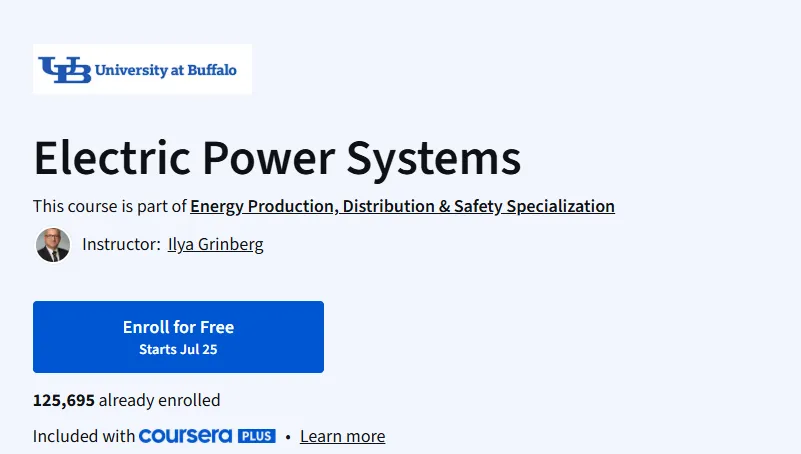What will you learn in Electric Power Systems Course
Grasp the core components and structure of modern electric power systems.
Understand how power flows from generation to consumption across the grid.
Explore major system equipment like transformers, circuit breakers, and generators.
Learn the basics of transmission, distribution, protection, and system reliability.
Program Overview
Module 1: Electric Power Systems Overview
⏱️ 1 week
Topics: Structure of power systems, energy flow, key stakeholders, reliability challenges.
Hands-on: Simple energy flow analysis, grid mapping.
Module 2: Power System Components
⏱️ 1 week
Topics: Transformers, generators, transmission lines, switchgear.
Hands-on: Explore specifications and design basics of transformers and generators.
Module 3: Power System Protection & Control
⏱️ 1 week
Topics: Circuit breakers, protection relays, fault detection, smart grid control.
Hands-on: Case-based learning on system fault response.
Module 4: Transmission and Distribution
⏱️ 1 week
Topics: HV/LV systems, transmission planning, substations, load balancing.
Hands-on: Evaluate energy loss during transmission, layout a simple substation plan.
Module 5: Power Quality & Reliability
⏱️ 1 week
Topics: Voltage regulation, harmonics, blackout case studies, demand response.
Hands-on: Analyze power quality disturbances using provided tools.
Get certificate
Job Outlook
High Demand: Vital for roles in utilities, infrastructure, energy tech, and renewables.
Career Roles: Power Systems Engineer, Electrical Grid Analyst, Utility Planner, Energy Consultant.
Salary Range: $70,000–$130,000/year depending on role and region.
Growth Areas: Smart grid, microgrid integration, renewable energy systems, system reliability.
Specification: Electric Power Systems
|
FAQs
- Basic understanding of electricity, circuits, and physics is helpful but not mandatory.
- The course introduces electric power system concepts step-by-step.
- Learners gradually explore generation, transmission, and distribution of electricity.
- Visual examples and diagrams make complex concepts easier to understand.
- Beginners can build a foundational understanding of power systems.
- The course explains electricity generation methods including thermal, hydro, and renewable sources.
- Learners study transmission lines, substations, and distribution networks.
- Safety standards, reliability, and efficiency considerations are introduced.
- Step-by-step examples link theoretical knowledge to real-world systems.
- Knowledge gained helps understand the complete flow of electrical power.
- Learners explore challenges such as load balancing, grid stability, and renewable energy integration.
- Concepts of smart grids, energy storage, and demand response are introduced.
- Exercises illustrate practical strategies for efficient power system operation.
- Knowledge helps analyze real-world power system scenarios and solutions.
- Skills are applicable to engineering roles in utilities and renewable energy projects.
- Knowledge of power systems is essential for roles in electrical engineering, energy management, and utilities.
- Understanding generation, transmission, and distribution improves employability for technical positions.
- Hands-on examples demonstrate practical understanding to potential employers.
- Skills in analyzing system efficiency and reliability enhance professional credibility.
- Completion shows readiness to contribute to power system design, operation, or research projects.
- Estimated completion is around 4–6 weeks at a part-time pace.
- Weekly effort of 4–6 hours is generally sufficient for lectures, exercises, and examples.
- Regular engagement with problem-solving and case studies reinforces learning.
- Revisiting exercises or exploring advanced topics may require extra time.
- Consistent study ensures learners develop both conceptual understanding and practical skills in electric power systems.





